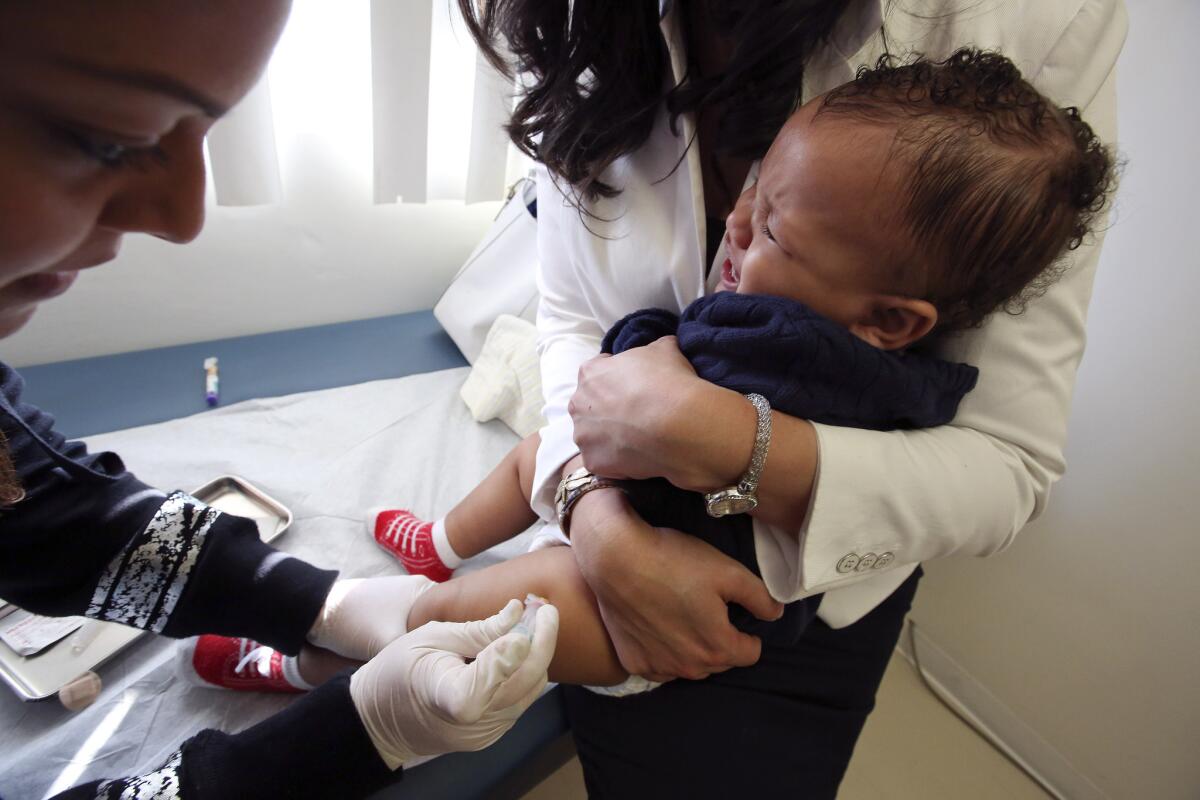Disneyland measles outbreak declared over, but political battle continues

Medical assistant Daisi Minor, left, gives a measles-mumps-rubella vaccine to Kristian Richard, 1, being held by his mother, Natasha, at the Medical Arts Pediatric Med Group on Wilshire Boulevard in Los Angeles this month.
- Share via
The measles outbreak that began at Disneyland over the winter holidays is over, California health officials said Friday.
A total of 131 people were infected with the measles in California as well as at least 25 others who resided in seven other states, Canada and Mexico. There have been no new measles cases related to the outbreak that began at Disneyland in 42 days.
It can take 21 days for a person infected with measles to show signs of illness. An outbreak can be declared over if no new illnesses are reported for 42 days.
“We are pleased this outbreak is over, but caution that measles can be reintroduced in California at any time when an infected person brings it to the state,” said Dr. Karen Smith, director of the California Department of Public Health. “The best defense for protection against the highly infectious measles is vaccination.”
Officials, however, warned that it’s still possible for measles to make a new resurgence in California when infected people enter the state. Health experts say the measles vaccination rate is too low in California and facilitates the spread of disease in an outbreak situation.
For the 131 measles cases among California residents, experts know the vaccination status of 81 of them. Most -- 70%, or 56 patients -- were completely unvaccinated.
The outbreak prompted legislation designed to get more children immunized.
But this week, that effort appeared to hit trouble.
A proposal that would require more children to be vaccinated in California faced objections from critics who said it would force thousands of non-immunized students out of public schools.
The measure’s author, Sen. Richard Pan (D-Sacramento), agreed to delay a vote on the bill after being warned by the Senate Education Committee chairwoman that it would not win the panel’s approval in its current form.
“If I were you, I would not take a vote today,” said the chairwoman, Sen. Carol Liu (D-La Cañada Flintridge).
She urged Pan to try to resolve the deep-seated concerns of a majority of committee members. “Otherwise, I don’t think your bill proceeds out of this committee,” she said.
The senators say the bill, which would remove the “personal belief” exemption from the state’s vaccination requirement, would mean that students whose parents refuse to immunize them would be barred from public schools.
“The penalty for not immunizing their kids is you either have to home-school or take your kids out of public schools, and I don’t think that’s a solution to the problem,” Liu said during the hearing, which lasted more than two hours as hundreds of parents and children testified.
Some parents refuse to immunize their children because they believe vaccines can have serious negative health effects, including autism. Medical studies say the shots are safe.
Twitter: @ronlin
More to Read
Sign up for Essential California
The most important California stories and recommendations in your inbox every morning.
You may occasionally receive promotional content from the Los Angeles Times.












